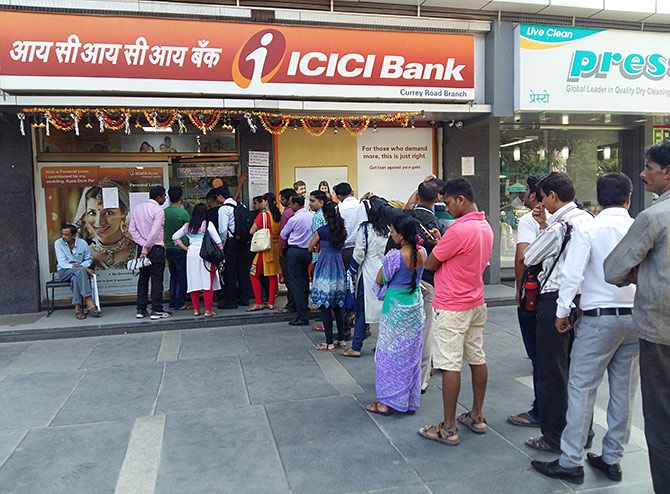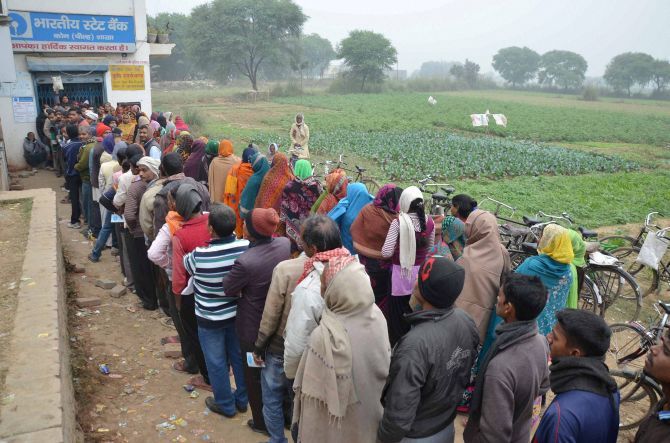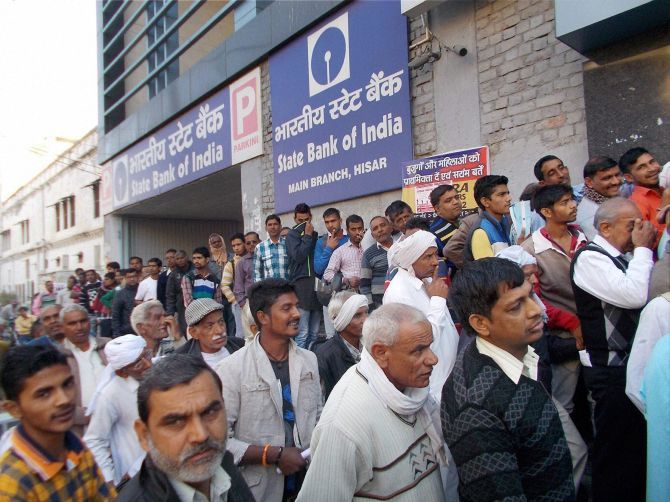Reports from Ludhiana, Coimbatore, Moradabad, Tirupur, Indore, Surat, Delhi, Mumbai, Kolkata, Chennai and Hyderabad, suggest the impact of demonetisation is worsening.
Arup Roychoudhury, T E Narasimhan, Sharath Chowdary and Ishita Ayan Dutt/Business Standard report.

A month after Prime Minister Narendra Modi announced nearly 86% of India's cash in circulation by value would lose their status as legal tender, the narrative has shifted from freeing the country of the scourge of black money and counterfeit cash to the need for a cashless economy and encouraging digital transactions.
Thirty days on, the initial chaos in banks and ATMs has lessened, but the lines are still there and the impact of the government decision on the economy is gradually unfolding.

The most comprehensive set of announcements aimed at placating the people came on Thursday, when Finance Minister Arun Jaitley announced sops to boost digital transactions.
Reports from Ludhiana, Coimbatore, Moradabad, Tirupur, Indore, Surat, Delhi, Mumbai, Kolkata, Chennai and Hyderabad, suggest the impact of demonetisation is worsening.
Digital transactions are at a nascent stage in most rural areas.

Even in the metros, banks and ATMs are running out of cash too soon.
"Unless there is more supply of Rs 500 notes, the cash crunch is likely to continue. We are taking various steps to replenish ATMs and banks. It will take 10 to 15 days for the situation to stabilise," said R K Takkar, chairman and managing director, UCO Bank.
The government's assessment on re-calibrating about 200,000 ATMs to fit the new and smaller Rs 500 and Rs 2,000 notes seems optimistic.

Arguments between customers and bank executives are now regular. The situation has worsened after utilities and petrol pumps stopped accepting old Rs 500 notes.
Reports from small towns indicate the situation is alarming.
In Coimbatore, the president of the Tamil Nadu Association of Cottage and Micro Enterprises, J James, said production was down 40% compared with 15% to 20% at the start of demonetisation.
"The situation has worsened," said James, adding banks were turning away small business owners and workers.

These units have cash credit accounts and can withdraw up to Rs 50,000 a week; yet, they cannot get their money because banks have to meet the requirements of other customers.
Around 400,000 workers depend on these small units in and around Coimbatore and their monthly salary ranges from Rs 15,000 to Rs 35,000.
At Tirupur, which exports Rs 36,000 crore (Rs 360 billion) of knitwear a year, the situation is the same. Here, wages are paid weekly and the wage bill is Rs 75 crore (Rs 750 million) a week.

This is a story across the country, in brassware units of Moradabad, hosiery factories of Ludhiana and the diamond centre of Surat.
Small and medium enterprises are unable to pay workers on time, many have been laid off for now or are not turning up for work.
Orders are not being delivered and new orders are in short supply.
Small businesses, their customers and suppliers still depend extensively on cash.
This goes for exporters and the trucking business as well.

Scarcity of cash has restricted the movement of trucks that carry raw material, food and finished products across the country.
What gives hope to the government and the people, however, are reports of tax officials apprehending money launderers and tax evaders.
The move would definitely provide results in the long run, said Ratnala Srikanth, a student standing in a queue at an ATM in Hyderabad.
"I am losing time, but our government may gain revenue with demonetisation. The government can use those funds for welfare measures," said T Shashidhar, also in the queue to withdraw money./p>
The RBI allows withdrawals of Rs 24,000 from savings accounts and Rs 50,000 from current accounts.
Depending on the availability of cash, banks are allowing savings account holders to withdraw up to Rs 4,000 and current account holders to withdraw Rs 6,000 at a go.
Some banks in Hyderabad have not fed their ATMs since November 8.
Economists are warning of a slowdown that will threaten India's status as the world's fastest growing economy. Even Jaitley accepts there will be a slowdown in this quarter and the next.
There are reports of around 84 deaths related to demonetisation. The Opposition has been relentless in its criticism and the winter session of Parliament has come to a halt.
"Are the benefits and stated aims of the scheme worth the economic costs and the deaths? That is what the government will need to answer eventually," said an economist, who did not wish to be named.
"The analysis will lead to even more uncomfortable questions," the economist added.











